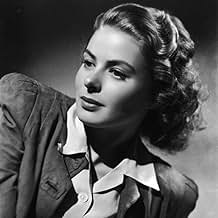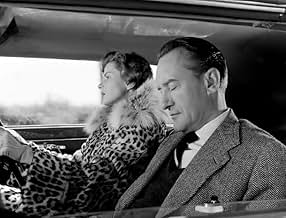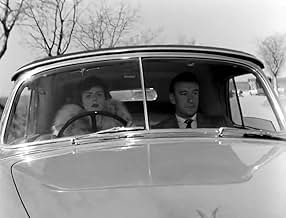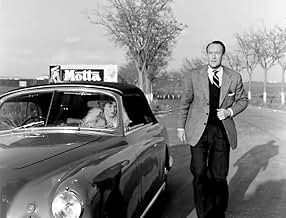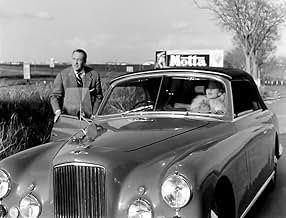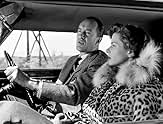NOTE IMDb
7,3/10
13 k
MA NOTE
Un couple marié et malheureux tente de trouver une direction et un sens à sa vie lors de vacances à Naples.Un couple marié et malheureux tente de trouver une direction et un sens à sa vie lors de vacances à Naples.Un couple marié et malheureux tente de trouver une direction et un sens à sa vie lors de vacances à Naples.
- Réalisation
- Scénario
- Casting principal
- Récompenses
- 3 victoires au total
George Sanders
- Alex Joyce
- (as Georges Sanders)
Maria Mauban
- Marie
- (as Marie Mauban)
Anthony La Penna
- Tony Burton
- (as Leslie Daniels)
Natalia Ray
- Natalie Burton
- (as Natalia Rai)
Bianca Maria Cerasoli
- Un'amica di Judy
- (non crédité)
Adriana Danieli
- Un'amica di Judy
- (non crédité)
María Martín
- Judy
- (non crédité)
Lyla Rocco
- La signora Sinibaldi
- (non crédité)
Avis à la une
Seems long and drawn out until you get to the final moment which is a marvellous thing, then you realise how great a film it was, in hindsight.
Possibly influenced Bunuel - some of the tree lined avenues and the religious saturation of a culture, the slowness of the story, it all reminded me of Bunuel. It's also acknowledged to be an influence on Godard's Contempt and it was interesting to see how it inspired parts of that film - the estranged couple cast against stunning Italian Neapolitan scenery. Must be a great story for it to have been filmed so well twice.
Possibly influenced Bunuel - some of the tree lined avenues and the religious saturation of a culture, the slowness of the story, it all reminded me of Bunuel. It's also acknowledged to be an influence on Godard's Contempt and it was interesting to see how it inspired parts of that film - the estranged couple cast against stunning Italian Neapolitan scenery. Must be a great story for it to have been filmed so well twice.
Few films have inspired as much critical folderol as "Journey to Italy". Godard considered it a masterpiece, which is always a cause for worry; he had a sharp eye for directing technique, but not so much for storytelling. "Journey to Italy" reflects this defect, and cannot be called a masterpiece without caveat.
The title is certainly accurate. We follow Alex (George Sanders) and Katherine Joyce (Ingrid Bergman) on a journey through Italy, on their way to sell a mansion Alex' uncle left him, and enjoy some time together.
Their marriage is unhappy. We gather as much from the opening scene, when Alex requests that he drives instead of Katherine. Why so? To keep him awake, he says. Clearly, that's not the whole truth. He may think lowly of her driving skills. Or maybe he can't abide her being in control. Or is he really just bored? It's hard to tell with a sarcast like Sanders.
Katherine feels uncomfortable too, but doesn't call her husband out directly. 'It didn't occur to me that it'd be so boring for you to be alone with me,' she says instead. 'What's that got to do with it? I'm just bored because I've got nothing to do,' Alex replies. Neither is saying what they wanted to say.
That is "Journey to Italy" in a nutshell. Alex and Katherine's marriage could be saved if ever the two were honest with each other, but their emotional defences block every attempt. The tragedy is not that the two don't see what is happening. The tragedy is that they do, and fail to change their ways. Once living with a person for a certain period to time, one cannot suddenly play straight. Alex and Katherine are stuck in vicious circle they have created for themselves.
Rosselini is partially successful in portraying this tragedy. The parts that play out like the above scene have been rightly praised for their bold, elusive storytelling. The best scenes are those in which nothing of apparent notice happens: Katherine takes three tourist tours (set to foreboding music); Alex goes to a party and fails to enjoy himself. What goes on in their heads is left to guess. Antonioni was undoubtedly inspired by "Journey to Italy" when he employed the same technique in his Trilogy ("L'avventura", "La notte", "L'eclisse") -- to greater effect.
Comparison between the directors shows where Rosselini falls short. Note how Antonioni always stays on the surface. He complements the superficial quibbles of his characters with crystal-clear images, and leaves digging to his viewers. Rossellini, meanwhile, wavers. One scene, his characters speak in those natural and shrouded sentences. The next, they indulge in syrupy Hollywood platitudes, or worse: voice-over narration, to directly tell the audience how they feel. The script feels schizophrenic, possibly reflecting its two screenwriters. It is bold and elusive as often as safe and uninvolving.
As such, "Journey to Italy" can only be recommended with reservations. That certain critics fail to provide these is a serious fault. Imagine the Michelin Guide awarding a restaurant three stars despite part of their dishes being undercooked. To appreciate "Journey to Italy", one must seek out the well-done bits.
The title is certainly accurate. We follow Alex (George Sanders) and Katherine Joyce (Ingrid Bergman) on a journey through Italy, on their way to sell a mansion Alex' uncle left him, and enjoy some time together.
Their marriage is unhappy. We gather as much from the opening scene, when Alex requests that he drives instead of Katherine. Why so? To keep him awake, he says. Clearly, that's not the whole truth. He may think lowly of her driving skills. Or maybe he can't abide her being in control. Or is he really just bored? It's hard to tell with a sarcast like Sanders.
Katherine feels uncomfortable too, but doesn't call her husband out directly. 'It didn't occur to me that it'd be so boring for you to be alone with me,' she says instead. 'What's that got to do with it? I'm just bored because I've got nothing to do,' Alex replies. Neither is saying what they wanted to say.
That is "Journey to Italy" in a nutshell. Alex and Katherine's marriage could be saved if ever the two were honest with each other, but their emotional defences block every attempt. The tragedy is not that the two don't see what is happening. The tragedy is that they do, and fail to change their ways. Once living with a person for a certain period to time, one cannot suddenly play straight. Alex and Katherine are stuck in vicious circle they have created for themselves.
Rosselini is partially successful in portraying this tragedy. The parts that play out like the above scene have been rightly praised for their bold, elusive storytelling. The best scenes are those in which nothing of apparent notice happens: Katherine takes three tourist tours (set to foreboding music); Alex goes to a party and fails to enjoy himself. What goes on in their heads is left to guess. Antonioni was undoubtedly inspired by "Journey to Italy" when he employed the same technique in his Trilogy ("L'avventura", "La notte", "L'eclisse") -- to greater effect.
Comparison between the directors shows where Rosselini falls short. Note how Antonioni always stays on the surface. He complements the superficial quibbles of his characters with crystal-clear images, and leaves digging to his viewers. Rossellini, meanwhile, wavers. One scene, his characters speak in those natural and shrouded sentences. The next, they indulge in syrupy Hollywood platitudes, or worse: voice-over narration, to directly tell the audience how they feel. The script feels schizophrenic, possibly reflecting its two screenwriters. It is bold and elusive as often as safe and uninvolving.
As such, "Journey to Italy" can only be recommended with reservations. That certain critics fail to provide these is a serious fault. Imagine the Michelin Guide awarding a restaurant three stars despite part of their dishes being undercooked. To appreciate "Journey to Italy", one must seek out the well-done bits.
Katherine (Ingrid Bergman) and Alex Joyce (George Sanders) are on vacation in Italy. It's been eight years of marriage and they feel like strangers to each other.
This is scenes from a marriage and a road trip to personal discovery. It's meandering but that's perfectly fine. It's meant to be. Director Roberto Rossellini inadvertently starts a new movement in looser story telling in films. It's jazz when music has been all classical. The only ill-fitting aspect is the glamor of Ingrid Bergman. It's not a big thing or even a bad thing. She cannot be less than the movie superstar beauty that she is. It takes me out of the movie sometimes although there is an autobiographical suggestion within these characters. It takes away from their everyday struggles within their relationship. I do wonder if an average looking couple would make this an even more compelling examination into a marriage. I also wonder if the couple should stay together throughout the movie so that they can fill out their relationship more. I want them to talk this out together from start to finish.
This is scenes from a marriage and a road trip to personal discovery. It's meandering but that's perfectly fine. It's meant to be. Director Roberto Rossellini inadvertently starts a new movement in looser story telling in films. It's jazz when music has been all classical. The only ill-fitting aspect is the glamor of Ingrid Bergman. It's not a big thing or even a bad thing. She cannot be less than the movie superstar beauty that she is. It takes me out of the movie sometimes although there is an autobiographical suggestion within these characters. It takes away from their everyday struggles within their relationship. I do wonder if an average looking couple would make this an even more compelling examination into a marriage. I also wonder if the couple should stay together throughout the movie so that they can fill out their relationship more. I want them to talk this out together from start to finish.
This movie is being an example of some simplistic but beautiful and effective film-making. It doesn't follow a big story in which a big conflict suddenly arises or something needs to get solved or found but it's simply a movie about a, somewhat elderly British(?) couple, on holiday in Italy, who suddenly start to realize that they have never really loved each other.
It's a movie that works because of how well done and beautifully it all got done. It obviously helps that the movie is being set in Italy and features some of the famous landmarks, in and around Napels. The movie focus a lot on the culture and history, since the movie is seen through the eyes of our two main characters, that are tourists and new to the country. There is always something happening in the movie, even though it really doesn't follow a that complicated or thick storyline. It's a movie that prefers realism and is basically a random slice of life and about marriage, that of course is not always anything romantic or love filled. Suddenly they start to learn more about each other and about themselves, which makes them realize that they are perhaps not meant to be together. Doesn't sound that interesting perhaps but the way the story gets told simply makes this a great one to watch, that also never bores. Granted that it's also a quite short movie.
The movie also works well because the characters in it are being realistic and they interacting convincingly with each other. Both George Sanders and Ingrid Bergman gave some fine performances in this movie and were a convincing screen couple, who's marriage has worn out.
It's also a movie that benefits from the fact that it got done in black & white. For some reason I think this movie would had been way more cheesy had it been shot in full color. Instead now the movie has some real class and beauty to it as well.
Despite that it's a movie set in Italy and also an Italian produced movie, with an Italian title, it's still an mostly English spoken film. At least the two main characters speak Italian throughout. So those who normally won't come near a 'foreign' film can also easily watch this one, if you pick up the right, original, version of it of course.
Simply one fine little, well done, effective movie, by Italian director Roberto Rossellini.
8/10
http://bobafett1138.blogspot.com/
It's a movie that works because of how well done and beautifully it all got done. It obviously helps that the movie is being set in Italy and features some of the famous landmarks, in and around Napels. The movie focus a lot on the culture and history, since the movie is seen through the eyes of our two main characters, that are tourists and new to the country. There is always something happening in the movie, even though it really doesn't follow a that complicated or thick storyline. It's a movie that prefers realism and is basically a random slice of life and about marriage, that of course is not always anything romantic or love filled. Suddenly they start to learn more about each other and about themselves, which makes them realize that they are perhaps not meant to be together. Doesn't sound that interesting perhaps but the way the story gets told simply makes this a great one to watch, that also never bores. Granted that it's also a quite short movie.
The movie also works well because the characters in it are being realistic and they interacting convincingly with each other. Both George Sanders and Ingrid Bergman gave some fine performances in this movie and were a convincing screen couple, who's marriage has worn out.
It's also a movie that benefits from the fact that it got done in black & white. For some reason I think this movie would had been way more cheesy had it been shot in full color. Instead now the movie has some real class and beauty to it as well.
Despite that it's a movie set in Italy and also an Italian produced movie, with an Italian title, it's still an mostly English spoken film. At least the two main characters speak Italian throughout. So those who normally won't come near a 'foreign' film can also easily watch this one, if you pick up the right, original, version of it of course.
Simply one fine little, well done, effective movie, by Italian director Roberto Rossellini.
8/10
http://bobafett1138.blogspot.com/
Viaggio in Italia (1954) was shown in the United States with the translated title Voyage to Italy. The movie was co-written and directed by Roberto Rossellini.
The film stars Ingrid Bergman as Katherine Joyce and George Sanders as Alex Joyce, her husband. They are both very British. (Sanders was British. Bergman couldn't handle the English accent.) They no longer love each other. They decide to go to Naples to try to salvage what's left of their marriage.
A marriage that's falling apart is a classic narrative. A trip to try to repair the damage is also classic. What's not classic is why anyone could believe that this marriage could be saved. Sanders tells Bergman that when he's alone with her he's bored. (Right.) He leaves Naples for a few days, and when he returns he picks up a prostitute rather than return to Bergman. He drives the prostitute to a park, and then takes home without touching her. (Right.) OK--it's 1954, but even so that's a weird scene.
The ending of the film is so bizarre that it defies description, so I won't describe it. Voyage to Italy is considered a Very Important Movie, and has a solid IMDB rating of 7.4. Maybe fellow raters saw something in the movie that I didn't see, or maybe they saw a different movie. I rated it 6, and that was a gift to honor Bergman's acting skills.
The film stars Ingrid Bergman as Katherine Joyce and George Sanders as Alex Joyce, her husband. They are both very British. (Sanders was British. Bergman couldn't handle the English accent.) They no longer love each other. They decide to go to Naples to try to salvage what's left of their marriage.
A marriage that's falling apart is a classic narrative. A trip to try to repair the damage is also classic. What's not classic is why anyone could believe that this marriage could be saved. Sanders tells Bergman that when he's alone with her he's bored. (Right.) He leaves Naples for a few days, and when he returns he picks up a prostitute rather than return to Bergman. He drives the prostitute to a park, and then takes home without touching her. (Right.) OK--it's 1954, but even so that's a weird scene.
The ending of the film is so bizarre that it defies description, so I won't describe it. Voyage to Italy is considered a Very Important Movie, and has a solid IMDB rating of 7.4. Maybe fellow raters saw something in the movie that I didn't see, or maybe they saw a different movie. I rated it 6, and that was a gift to honor Bergman's acting skills.
Le saviez-vous
- AnecdotesGeorge Sanders, in his 1960 autobiography, wrote at length about the making of this film, which he found an exasperating and unpleasant experience. He spoke witheringly about Roberto Rossellini, whom he characterized as being more interested in scuba diving than in film-making. Although the tone of his remarks is one of amusement, it became known that Sanders (who had admired earlier Rossellini films) had been deeply affected by exposure to a style of film-making quite foreign to his previous experience, and had spent the shoot feeling frustrated and angry, often bursting into uncontrollable tears.
- GaffesAfter deciding to leave Pompeii and walking down the stairs for the exit, the arm and shoulder of a crew member appear in the lower right side of the screen.
- Citations
Alex Joyce: What noisy people! I've never seen noise and boredom go so well together.
Katherine Joyce: Oh I don't know, Uncle Homer lived here for 40 years without getting bored.
Alex Joyce: Uncle Homer was not a normal person.
- ConnexionsEdited into Histoire(s) du cinéma: Fatale beauté (1994)
Meilleurs choix
Connectez-vous pour évaluer et suivre la liste de favoris afin de recevoir des recommandations personnalisées
- How long is Journey to Italy?Alimenté par Alexa
Détails
Box-office
- Montant brut mondial
- 20 072 $US
- Durée1 heure 25 minutes
- Couleur
- Mixage
- Rapport de forme
- 1.37 : 1
Contribuer à cette page
Suggérer une modification ou ajouter du contenu manquant

Lacune principale
By what name was Voyage en Italie (1954) officially released in India in English?
Répondre

